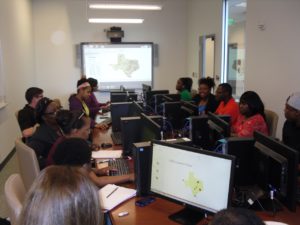or keep pressing Tab key no navigate
 The National Science Foundation (NSF) announced a Targeted Infusion Project Award (TIP) award of $399,999 over 3 years to Dr. Maruthi Sridhar Balaji Bhaskar (PI) of Department of Environmental and Interdisciplinary Sciences (EIS), Dr. Jason Rosenzweig (Co-PI) and Dr. Shishir Shishodia (Co-PI) of Department of Biological Science at Texas Southern University (TSU) to support the project on “Infusion of Geospatial Informatics to Enhance Undergraduate Biological Science Program”. The goal of the project is to diversify the biology curriculum by enhancing existing courses, establishing new undergraduate courses, developing geospatial certification program and increasing summer undergraduate research and training opportunities at TSU. This project aims to enhance, and strengthen the interdisciplinary research skills of students by infusion of geospatial sciences into the biological sciences curriculum and develop a diverse workforce in College of Science Engineering and Technology (COSET) at TSU. In this program, undergraduate students will be introduced to interdisciplinary teaching and research to meet the 21st century global challenges in the fields of geospatial information, environmental science, ecology, natural resource, and human health management. Geospatial Informational Science and Technology (GIST) is a rapidly expanding interdisciplinary science, which integrates the hardware and software to capture, manage, analyze and display all forms of data with a geographic, spatial, and temporal context. Geospatial technology has become integral to decision making in a variety of disciplines, such as: geology, environmental science, ecology, civil engineering, transportation, urban planning, business, and health care. It is also projected to become one of the nation’s largest growth industries. The infusion of geospatial sciences will establish a strong interdisciplinary research base at TSU and bring awareness for quantitative spatial research in ecological, engineering, and technology fields of study. The proposed activities are expected to increase student interest in Science, Technology, Engineering and Math (STEM) related fields, attract additional prospective undergraduate students, increase student progression and retention in STEM disciplines to graduate studies, and serve as a possible replicable model for other institutions. The project will enhance the research experience and training of undergraduate and graduate students at TSU. The research project will provide financial support for undergraduate and graduate students at TSU, train them in state-of-the-art geospatial techniques and enhance collaboration and internship opportunities. Dr. Bhaskar has an ongoing NSF research project on Mercury fate and dynamics in watersheds, this project along with the new NSF targeted infusion project will strengthen the geospatial research and teaching endeavor between the Department of EIS, Department of Biology and other departments in COSET at TSU.
The National Science Foundation (NSF) announced a Targeted Infusion Project Award (TIP) award of $399,999 over 3 years to Dr. Maruthi Sridhar Balaji Bhaskar (PI) of Department of Environmental and Interdisciplinary Sciences (EIS), Dr. Jason Rosenzweig (Co-PI) and Dr. Shishir Shishodia (Co-PI) of Department of Biological Science at Texas Southern University (TSU) to support the project on “Infusion of Geospatial Informatics to Enhance Undergraduate Biological Science Program”. The goal of the project is to diversify the biology curriculum by enhancing existing courses, establishing new undergraduate courses, developing geospatial certification program and increasing summer undergraduate research and training opportunities at TSU. This project aims to enhance, and strengthen the interdisciplinary research skills of students by infusion of geospatial sciences into the biological sciences curriculum and develop a diverse workforce in College of Science Engineering and Technology (COSET) at TSU. In this program, undergraduate students will be introduced to interdisciplinary teaching and research to meet the 21st century global challenges in the fields of geospatial information, environmental science, ecology, natural resource, and human health management. Geospatial Informational Science and Technology (GIST) is a rapidly expanding interdisciplinary science, which integrates the hardware and software to capture, manage, analyze and display all forms of data with a geographic, spatial, and temporal context. Geospatial technology has become integral to decision making in a variety of disciplines, such as: geology, environmental science, ecology, civil engineering, transportation, urban planning, business, and health care. It is also projected to become one of the nation’s largest growth industries. The infusion of geospatial sciences will establish a strong interdisciplinary research base at TSU and bring awareness for quantitative spatial research in ecological, engineering, and technology fields of study. The proposed activities are expected to increase student interest in Science, Technology, Engineering and Math (STEM) related fields, attract additional prospective undergraduate students, increase student progression and retention in STEM disciplines to graduate studies, and serve as a possible replicable model for other institutions. The project will enhance the research experience and training of undergraduate and graduate students at TSU. The research project will provide financial support for undergraduate and graduate students at TSU, train them in state-of-the-art geospatial techniques and enhance collaboration and internship opportunities. Dr. Bhaskar has an ongoing NSF research project on Mercury fate and dynamics in watersheds, this project along with the new NSF targeted infusion project will strengthen the geospatial research and teaching endeavor between the Department of EIS, Department of Biology and other departments in COSET at TSU.